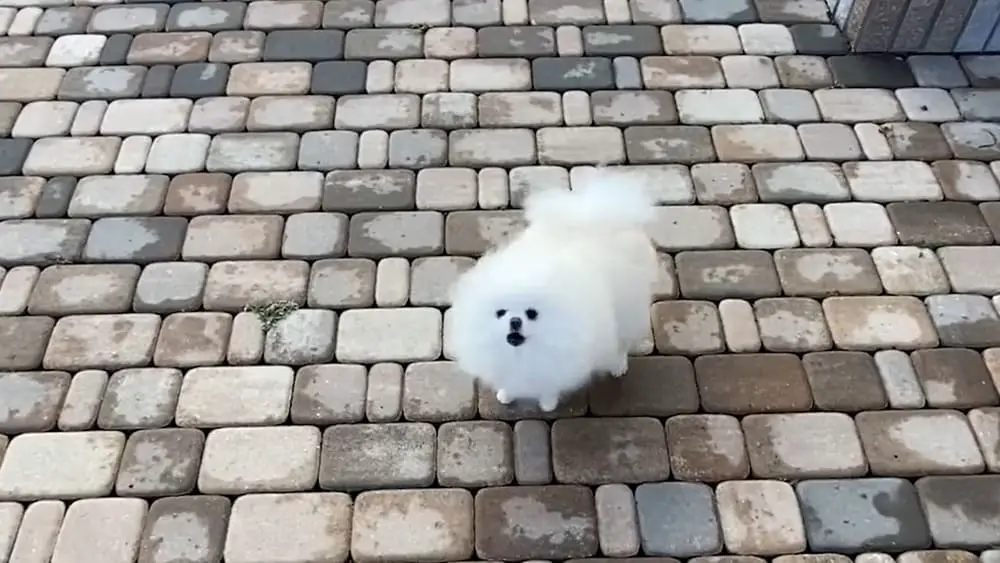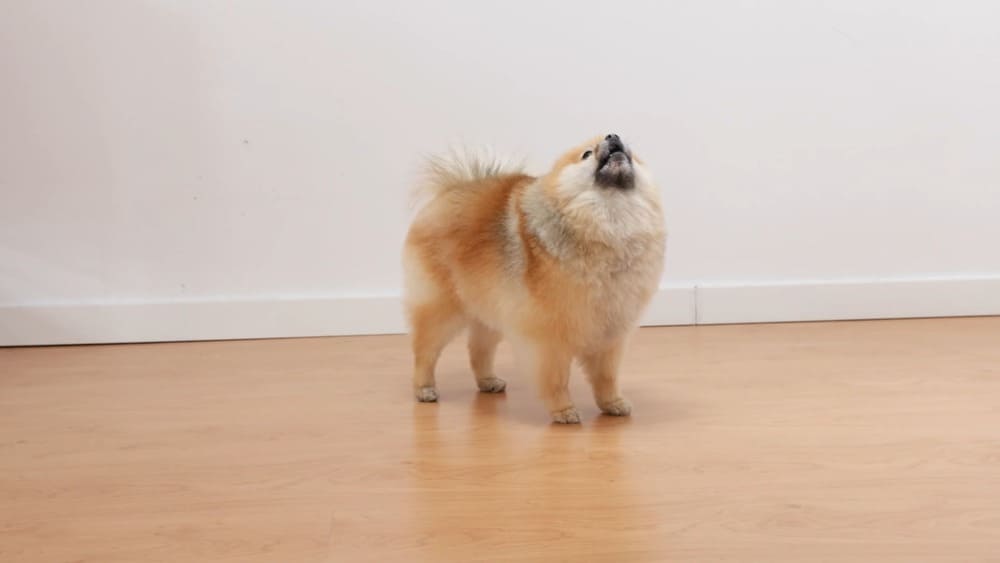Barking is part of a dog’s life. It’s also quite common that your Pomeranian will bark at the sound of any passersby outside the house. However, it can be causing quite a disturbance especially when you’re living inside condominiums and apartments. Hushing them to quietness will be pretty handy. But, can Pomeranians be trained not to bark? This post will reveal it all.

Table of Content
- Can Pomeranians Be Trained Not to Bark?
- What are effective methods to train Pomeranians not to bark?
- How long does it take to train a Pomeranian to stop barking?
- Are there certain triggers that cause Pomeranians to bark more?
- How to stop Pomeranians from barking at strangers?
- Best bark control methods for Pomeranians
- Training Pomeranians not to bark at night
- Quiet commands for Pomeranians
Can Pomeranians Be Trained Not to Bark?

Yes, Pomeranians can be trained not to bark. I’ve trained my own Pomeranians with great success. The focus here isn’t about complete bark prevention but teaching your Pomeranian when it’s acceptable to express itself and when it’s not.
Firstly, understanding what triggers your Pomeranian’s barking is crucial. These triggers can include strangers, nightfall, or even certain sounds. Observing them closely will point out these Pomeranian barking triggers.
Effective Pomeranian bark training involves consistent use of quiet commands. The strength lies in repetition: teach your Pomeranian a simple ‘quiet’ command and reinforce it progressively.
Another great method for training Pomeranians not to bark is the use of positive reinforcement. Reward your dog whenever they successfully obey the quiet command. The joy of earning a treat or an affectionate pat will motivate them to respond positively to the command over time.


Take note, it’s unrealistic to expect overnight results. Patience, consistency, and love are key in Pomeranian bark training. Results vary widely; for some, it can take a while to see noticeable Pomeranian bark reduction.
Always remember, Pomeranians naturally love to express themselves vocally. This trait should not be seen as a Pomeranian barking problem, but rather a trait that can be managed effectively.

What are effective methods to train Pomeranians not to bark?

Understanding Pomeranian Barking Triggers is the building block of any successful Pomeranian bark training program. It’s important to carefully observe your pup, identifying specific stimuli that instigate excessive barking. Pomeranians often bark at strangers, certain sounds, or even at night.
Let’s now delve into some strong Pomeranian barking solutions.
Utilize the Pomeranian quiet command approach. It involves teaching the dog to associate a single word or gesture (like “Enough” or “Quiet”) with the action of stopping barking. Start by using the quiet command when your Pomeranian barks. When they stop, reward them with a treat or praise, reinforcing a positive behavior.

An alternative is the Pomeranian bark control methods that use distraction or deterrents. When your Pomeranian starts barking – divert their attention with a unique sound or action that’s not scary or damaging. This method breaks their barking cycle and diverts their focus elsewhere.
Remember, teaching Pomeranians not to bark is a long-running process. Although the timeline for how long to train Pomeranian not to bark is indeterminable, it’s certainly achievable with consistency, patience and love.

How long does it take to train a Pomeranian to stop barking?

The burning question in the minds of many Pomeranian owners is “How long to train Pomeranian not to bark?” Well, the answer isn’t straightforward.
There’s no set time frame to completely stop Pomeranian barking. This is because each Pomeranian has unique barking habits influenced by a myriad of factors including personality and environment.
The Pomeranian bark training process is impacted not just by these factors but also by how well you understand your Pomeranian’s barking triggers. It might take a few weeks to significantly reduce the issue of Pomeranian excessive barking for some, while others could see results in a matter of days.


Learning Pomeranian bark control methods like the Pomeranian quiet command can show quick results. The key is to be consistent with your training. However, always remember a completely bark-free Pomeranian isn’t a realistic goal. The objective of bark training is Pomeranian bark reduction, not total elimination.
In the end, patience is required when teaching Pomeranians not to bark. Your consistency and understanding of Pomeranian barking triggers will ultimately determine the success rate of curb training. With time, you’ll see a remarkable change in your pet’s behavior.

Are there certain triggers that cause Pomeranians to bark more?

As any seasoned dog owner can testify, different dogs bark for various reasons, and Pomeranians are no exception. When it comes to Pomeranian barking, understanding the triggers behind this behavior can make your task of training Pomeranians not to bark a bit easier.
A common scenario that could ramp up your Pomeranian’s barking is the presence of strangers. Many dogs, Pomeranians included, tend to bark at unfamiliar faces as a way of expressing discomfort or protecting their territory. So, if you notice your Pomeranian barking at strangers, understand that it’s a natural response.

Even the dark of night can stir up some Pomeranian barking. Yes, Pomeranians are known for “barking at night”. The reason? Their acute senses pick up sounds that we cannot hear. It’s their instinct to alert their pack (that’s you) about potential danger.
Pomeranian excessive barking might also be due to boredom or separation anxiety. Quite simply, your Pomeranian might just miss you!
Lastly, let me emphasize: these are general factors. Every Pomeranian is unique and yours might have different triggers. Practicing Pomeranian bark control methods, like using the Pomeranian quiet command, is a way to navigate these triggers. It does require patience and a solid understanding of your Pomeranian’s barking habits. As you embark on this journey of Pomeranian bark training, remember that the goal isn’t to stop Pomeranian barking entirely but to control and reduce it manageable levels.

How to stop Pomeranians from barking at strangers?

When it comes to Pomeranian barking at strangers, it’s quite a common issue for this breed. Understanding the underlying Pomeranian barking triggers can significantly help with Pomeranian bark control.
Firstly, we need to introduce the Pomeranians to a wide range of people from an early age. This is referred to as socialization. It allows the Pomeranian to become familiar with different faces, reducing their engagement in Pomeranian excessive barking when they encounter strangers.

Pomeranian bark training techniques are essential in these scenarios. Using a Pomeranian quiet command alongside treats or toys as rewards can effectively stop Pomeranian barking. Remember, the key is rewarding the quietness, not the barking.
A useful method for training Pomeranians not to bark at strangers is the ‘quiet’ command. You say ‘quiet’ when they start barking at a stranger, rewarding them when they cease barking. With time and consistent use of this Pomeranian bark control method, Pomeranians can learn to associate being quiet with positive outcomes.
Peppered with patience and a good understanding of Pomeranian barking habits, these strategies can significantly help to reduce barking in Pomeranians.

Best bark control methods for Pomeranians

Venturing further into Pomeranian bark control methods, let’s delve into some successful techniques to dull down those yaps. Indeed, there’s a multitude of ways to approach Pomeranian bark training.
One great technique is introducing quiet commands to your Pomeranian. Since they’re already quite receptive to commands, it doesn’t take a long time to train a Pomeranian not to bark. Teaching the ‘quiet’ command works wonders in stopping Pomeranian barking. Be patient, though. Stay consistent with your command, and reward them for silence. It’ll reinforce the behavior.

Another vital part of the equation is the identification and avoidance of Pomeranian barking triggers. Pomeranians often bark excessively at night or at strangers due to the fear of the unknown. By learning what scares your dog, you can reduce the bark frequency.

Try not to overlook potential Pomeranian barking problems, such as health issues causing discomfort. Always be sure to consult a vet if you suspect this.
Lastly, using distraction tools as Pomeranian bark deterrents, like toys, can shift their focus from barking.
Remember, patience and consistency are your allies here. It takes a little time, but with the correct approach, training Pomeranians not to bark is doable, enhancing your lifestyle and the well-being of your Pomeranian.
Training Pomeranians not to bark at night

It’s a common concern – Pomeranian barking at night. Like any other bark training, teaching your Pomeranian not to bark at night involves understanding their triggers and reinforcing quiet commands.
Identifying possible reasons behind your Pomeranian’s excessive night-time barking is a solid starting point. Are they bored, anxious, scared, or simply reacting to regular sounds during the night? Pinpoint these Pomeranian barking triggers to help manage their behavior.
Once any triggers have been identified, we can use a Pomeranian quiet command. This is an instructive command, like ‘quiet’ or ‘hush,’ which you can teach them to respond to. Remember, consistency is key. Regularly practicing these commands during the day may lead to quieter nights.

Consider introducing Pomeranian bark control measures to help control night-time haywire. A bark deterrent, like a white noise machine, might provide a helpful nudge towards quieter nights by masking those usual night-time sounds that your Pomeranian may react to.
Lastly, don’t forget the power of diversion. Toys can be a fantastic Pomeranian bark prevention method. A well-selected toy could keep your furry friend busy, reducing the chance they’ll resort to barking out of boredom.
So, effectively training Pomeranians not to bark at night marries the understanding of your Pom’s barking habits with patience and consistency. It may seem daunting, but with time, those quiet nights could be just around the corner.
Quiet commands for Pomeranians

While Pomeranian barking at night or at strangers can be frustrating, it’s important to remember that these tiny dogs use barking as a form of communication. The key to addressing such Pomeranian barking problems is not about complete elimination but rather Pomeranian bark control and reduction.
Training Pomeranians not to bark excessively starts with understanding their barking triggers. Once we have that knowledge, we can apply effective Pomeranian bark training techniques like quiet commands. A quiet command could be as simple as saying, “Quiet” or “Hush”.
In my experience, consistency matters a lot when implementing a Pomeranian quiet command. If you get frustrated and shout, then you are just adding to the noise. Stay patient. It may take longer to train some Pomeranians not to bark but their loveable personality makes it all worth it!
Be warned, though! Using a quiet command is not just a bark deterrent for Pomeranians. You must follow up with a reward system when they obey your command. This will motivate them to limit their barking habits and learn that silence often brings them treats. Likewise, make sure to address their barking triggers such as loneliness or anxiety, not just symptoms!
In the end, you’ll be surprised to see the improvements in your Pomeranian’s barking habits with just a simple quiet command. Remember, every Pomeranian has a unique personality. They may respond differently to training methods. Keep trying different methods until you find the one that gets results.
The Author

Valerie Seow, Lifestyle Blogger
Valerie Seow is a lifestyle blogger in Malaysia, sharing awesome findings and products that makes life sweeter. Get some great recommendations from that will improve your lifestyle!
Co-author

Zoey, Pomeranian
Zoey is a pomeranian dog. A comfort dog that comes to you when you’re sad and cheer things up. She’s charismatic and is natural to be in the spotlight.






